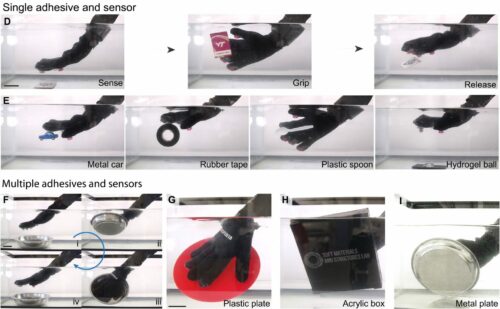Researchers from Virginia Tech in the US have used 3D printing to produce adhesive suckers that are inspired by octopuses!
Octopi and other cephalopods use a combination of sensing and controlled adhesives to attach to and manipulate items underwater. Modern synthetic adhesive-based manipulation systems frequently rely on human interaction rather than any kind of integrated sensing, which can lead to somewhat delayed adhesion activation and release. The Virginia Tech research team has now created its own neural system that is inspired by octopi and is capable of sensing objects and instantly turning on adhesion.
The scientists have developed a novel method for reliably manipulating things in an underwater environment by incorporating the 3D printing-enabled adhesive skin into a wearable glove. The pneumatically activated membranes on the ends of the silicone stalks in octopus-inspired glove served as grippers. The unique gripper shapes for the stalks were created using silicone elastomer that was poured into 3D printed moulds, cast, and then cured.

An assortment of microlight detection and ranging (LIDAR) optical proximity sensors were built into each of the sticky suckers. Microcontrollers for real-time object identification and sucking control were also included in the gloves. According to the research team, this hybrid of mechanical and electronic devices closely resembles the inner workings of the octopus nervous system.

The researchers discovered that their technology allowed adhesive strains of more than 60kPa after putting the gloves through a series of underwater trials. Additionally, over 450 times in less than 50 ms, the adhesion in the gloves could be turned on and off, exhibiting exceptional reversibility with cycle speeds quicker than those of real octopi.
The paper concludes, “Although this study is focused on optical sensors, different sensing modalities could also be used in the future. Chemical or mechanical sensors could be synergistic, and this could be particularly interesting as it is known that the octopus displays a diverse set of vision, chemical, and mechanical sensing during manipulation. There are also future opportunities to incorporate haptic feedback into this system to alert a user when adhesives are activated.”






